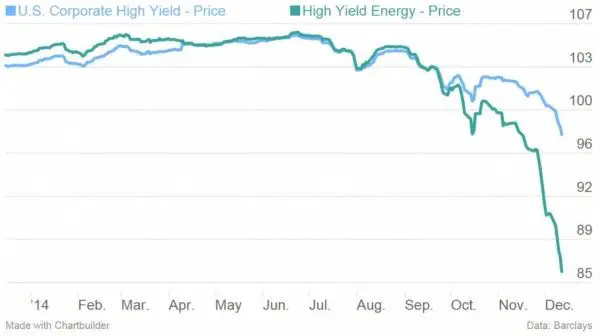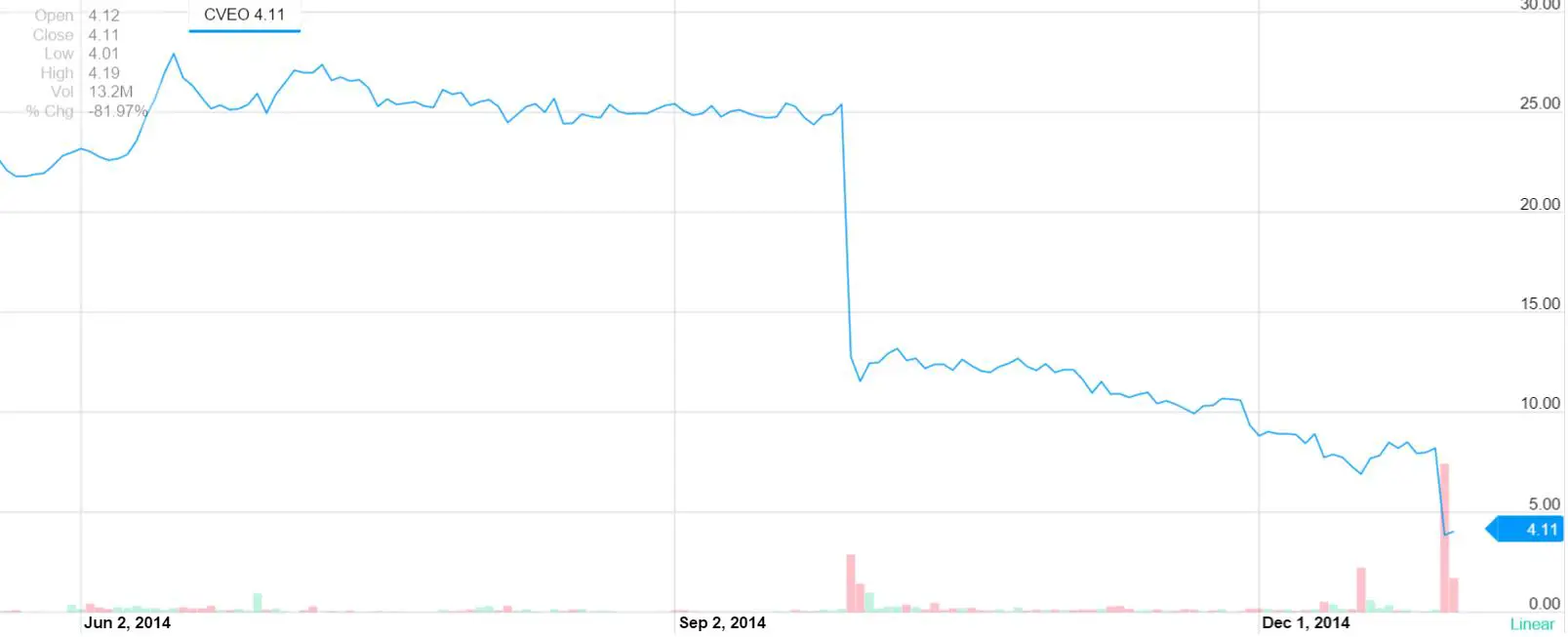Courtesy of John Rubino.
Warren Buffett’s classic observation that “You only see who’s swimming naked when the tide goes out” is being tossed around more frequently these days, as the world gets yet another deflation scare. Zero Hedge just published a great piece on this topic, which should be read in its entirety. In the meantime here’s a summary of the story with a few added bits.
Let’s begin with the common sense premise that overly-easy money sends a false-positive signal to market participants, leading them to buy and build things that maybe shouldn’t be bought or built. Then, when money goes back to a more reasonable price, the bad decisions (malinvestment in economist-speak) are revealed and financial turmoil ensues.
 Today’s situation has its roots in the 1980s, when the developed world got too lazy to live within its means and started borrowing way too much money. It then tried to inflate away its debts by creating a tidal wave of new currency and pushing interest rates down to unnaturally low levels. Flush with extra cash and cheap credit, consumers (especially in the US) bought huge amounts of imported junk. This in turn led China — the main producer of said junk — to go on an infrastructure/factory building spree of epic proportions, which shifted into hyper-drive after the 2008 crash. Chinese demand for industrial materials like copper, iron ore, and oil soared, pushing their prices far above historical averages.
Today’s situation has its roots in the 1980s, when the developed world got too lazy to live within its means and started borrowing way too much money. It then tried to inflate away its debts by creating a tidal wave of new currency and pushing interest rates down to unnaturally low levels. Flush with extra cash and cheap credit, consumers (especially in the US) bought huge amounts of imported junk. This in turn led China — the main producer of said junk — to go on an infrastructure/factory building spree of epic proportions, which shifted into hyper-drive after the 2008 crash. Chinese demand for industrial materials like copper, iron ore, and oil soared, pushing their prices far above historical averages.
This in turn led miners and drillers to mine and drill on an unprecedented scale, which caused the supply of industrial materials to surge. The flashiest case in point is the US shale oil boom, which sent domestic oil production back to levels not seen since Texas’ blockbuster oil fields were young.
But it was all a money illusion, and every part of this process has recently hit a wall. Consumers refuse to go more deeply into debt to buy non-necessities, even when money is nearly free. Faced with lower demand and poor cash flow from the past decade’s overbuilding, China has tapped the brakes on its infrastructure build-out. The US is trying to stop monetizing its debt, which has sent the dollar through the roof on foreign exchange markets, thus making life even harder for about half the world’s population.
As a result of the above, demand for basic materials is returning to normal levels, which, in the face of inflated supply, is tanking prices across the commodity complex.
In other words the tide has gone out, leaving a whole beach full of naked (and unfortunately not very attractive) bodies. Specifically:
Shale oil junk bonds. Back when oil was over $100 a barrel, everybody wanted to lend to drillers, especially in the exotic (and as it turns out fatally-flawed) shale oil sector. $170 billion of energy-related junk bonds are now outstanding, and they are tanking along with the price of oil.
Emerging market economies. These countries and their major companies have accumulated about $6 trillion of dollar-denominated debt, and with the dollar up more than 10% in the past year, the aggregate losses on those loans could exceed half a trillion dollars. Suddenly, the emerging market miracle looks disturbingly like the Asian Contagion that nearly brought down the 1990s global economy.
Mining/drilling firms. These guys ramped up in response to soaring oil, copper, iron ore, gold, and silver prices. Now many of them are earning less per unit of product than it costs to mine/drill it. Massive bankruptcies and consolidations are coming. One dot-comish sign of things to come is Civeo, which provides living quarters for workers pouring into oil fields and mines in Canada, Australia, and the US. With people pouring out instead of into these suddenly non-viable fields, the company’s services are no longer required.
The Texas economy. Texans are cool. But a big source of their cockiness vis-a-vis the rest of the country was due to the fact that the price of their main export — oil — was at historically high levels. Now that it’s not anymore, the Texas economy — like those of Brazil and Russia, is falling back to earth. JP Morgan Chase predicts a recession in 2015.
The US economy. It turns out that most of the full-time jobs gained in the past five years have come from the energy sector. Otherwise, it’s been part-time secretarial/fast food/temp work that no one actually wants and in any event can’t support a family. Reverse out the oil patch jobs and the $10 or so trillion it took to engineer the “recovery” will look like just another piece of money-illusion malinvestment.
Anyhow, that’s just a sampling of the badly-maintained bods suddenly on display. Most are now running for cover, which is an amusing sight for anyone not directly affected by their problems. Trouble is, it’s hard not to be affected by energy, debt and deflation.
Visit John's Dollar Collapse blog here >
Mining picture via Pixabay.





